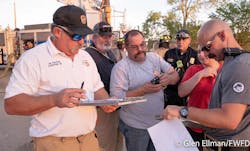As Firehouse Sees It: Preparing Your Fire Service Agenda for 2024
From recruitment and retention to ongoing supply chain delays and the increasing reliance on fire departments to respond to anybody’s and everybody’s emergency—perceived or real—every rank must collaborate to ensure that the fire service stays strong. This month, I suggest a few steps that you and your department can take going into next year to have a unified voice.
Start next door
With consistent staffing challenging departments large and small and budgets shrinking or staying flat while costs grow, the first step is reaching out to your adjacent agencies for sit-down discussions and mapping out the future.
As volunteer departments allow members from outside of their borders to join their operations and career departments offer substantial bonuses for lateral transfers, we find ourselves in a robbing-Peter-to-pay-Paul situation that requires additional funding and work to fill vacancies.
Regarding training, coordinate with neighboring agencies for sharing fixed or acquired structures or for cross-training if mutual/automatic aid policies are on paper. This allows for expanded training opportunities and/or relationship building. This can develop into a regional training group that allows you to pool resources and share skills.
Chiefs, encourage officers to join or start a regional officers association to allow them to seek input and direction for new-to-them scenarios and navigate leadership situations for which they lack education and understanding.
Federal fire grants sunsetting
It’s imperative that you get involved with politics at the local level, because the critical Assistance to Firefighter Grants (AFG) and Staffing for Adequate Fire and Emergency Response (SAFER) grant programs will sunset in September 2024. The programs, which were established in 2000 and 2003, respectively, have helped thousands of departments receive needed fire/rescue equipment and technology and myriad agencies receive funding to bolster rosters—often with those personnel resources deployed long distances from their own agency for wildfire and major disaster responses.
Your participation includes communicating to your politicians and their staff that they should show their support of the grants as a means of properly resourcing your agency to save the lives of their constituents and to serve as the nation’s first line of defense against humanmade and natural disasters. These resources include the equipment that they can’t afford with current budgets.
Although support for the programs has continued since their original expirations, it’s clear that there’s a need to battle for the funding in the current political environment.
Because we face a hotly debated presidential election next year, it’s important that you begin these grassroots efforts now and stay on the minds of your elected officials through the next budget cycle. You can invite them to your stations to talk to members who can illustrate where funding challenges and responses are in danger without assistance. An invitation can be extended to department events, such as training, honoring members for their lifesaving actions and a budget meeting, so the politicians and their staff members understand the realities of equipment costs in the post-pandemic world. A Fire Ops 101 event—where you put them in gear and allow them to engage in live fire or rescue operations—can open their eyes to the physically taxing duties that require proper staffing and updated and costly equipment.
In addition to your regional and state organizations, engage the Congressional Fire Services Institute (CFSI) for details on how to connect with your senators and representatives. As important as your role as a responder is, it’s equally important to become a champion to support the fire service. Through CFSI, you can spend a few days in April walking the halls of Congress in a nonpartisan effort during their National Fire and Emergency Services Dinner and Seminars Program.
Furthering your education
This step isn’t a plug for Firehouse’s events but a push to encourage you to venture outside of your comfort zone and attend events to learn about new products, technologies and operational strategies and to foster new relationships that can provide professional and personal support.
The benefits of attending symposiums, conferences or even a one-day workshop that occurs outside of your community allow you to expand your horizons and increase your awareness of trends and technologies that can affect all aspects of your role in the fire service. You can bring your concepts and solicit feedback from others who likely have encountered similar scenarios.
As we close 2023, the staff of Firehouse wishes you and your families at home and at the fire station a healthy New Year.
About the Author
Peter Matthews
Editor-in-Chief/Conference Director
Peter Matthews is the conference director and editor-in-chief of Firehouse. He has worked at Firehouse since 1999, serving in various roles on both Firehouse Magazine and Firehouse.com staffs. He completed an internship with the Rochester, NY, Fire Department and served with fire departments in Rush, NY, and Laurel, MD, and was a lieutenant with the Glenwood Fire Company in Glenwood Landing, NY. Matthews served as photographer for the St. Paul, MN, Fire Department and currently is a photographer for the Fort Worth, TX, Fire Department.

